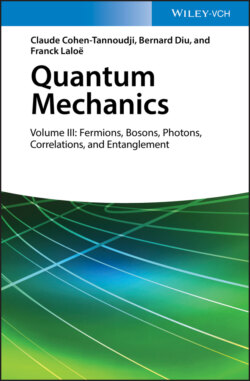Читать книгу Quantum Mechanics, Volume 3 - Claude Cohen-Tannoudji - Страница 27
A-5-a. Bosons: commutation relations
ОглавлениеConsider, for bosons, the two operators and . If both subscripts i and j are different, they correspond to orthogonal states |ui〉 and |uj〉. Using twice (A-16) then yields:
(A-30)
Changing the order of the operators yields the same result. As the Fock states form a basis, we can deduce that the commutator of and is zero if i ≠ j. In the same way, it is easy to show that both operator products aiaj and ajai acting on the same ket yield the same result (a ket having two occupation numbers lowered by 1); ai and aj thus commute if i ≠ j. Finally the same procedure allows showing that ai and commute if i ≠ j. Now, if i = j, we must evaluate the commutator of ai and . Let us apply (A-16) and (A-22) successively, first in that order, and then in the reverse order:
(A-31)
The commutator of ai and is therefore equal to 1 for all the values of the subscript i. All the previous results are summarized in three equalities valid for bosons:
(A-32)
